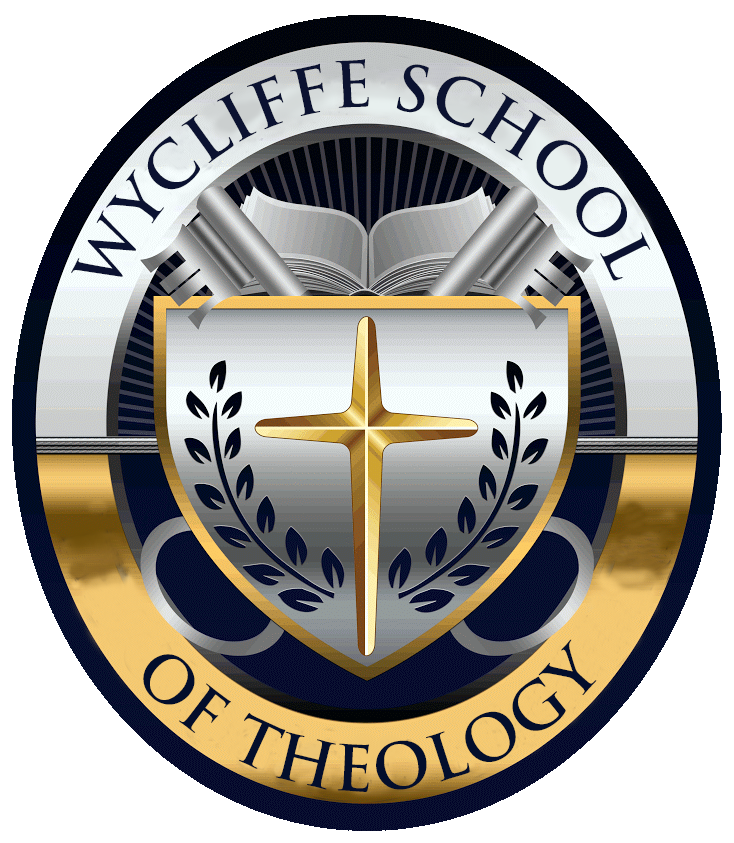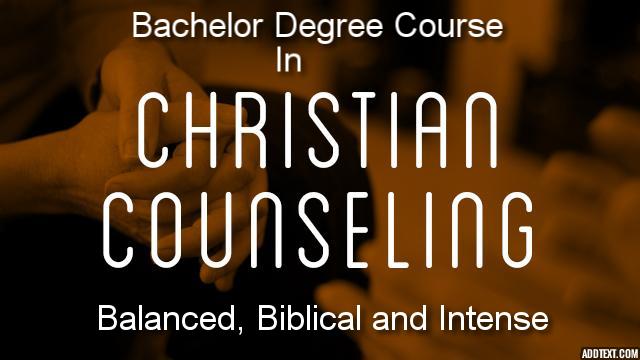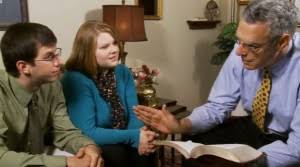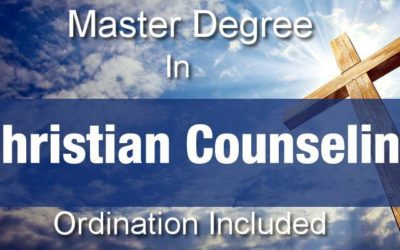Bachelor in Christian Counseling (B.C.C.) (60 and 30 credit hour programs)
**The 60 credit hour program is for those students that come in with an Associate Degree.
**The 30 credit hour program is for those students that come in with a previous Bachelors Degree, and courses will be selected from the 60 credit hour list below.
The Bachelor Degree in Christian Counseling degree prepares students either for ordained ministry in a Christian church, or for a wider engagement in society.
Course Outcomes
Upon the successful completion of the Bachelor Degree in Christian Counseling program, the students should be able to:
· Serve in ministry such as a local church and develop abilities and virtues that will prepare them for their calling and career
· Provide an in-depth Biblical foundation to supply the values, knowledge and skills needed to effectively serve in Christian Counseling ministry
· Formulate essential principles and ethics of Christianity
· Achieve personal growth in Christian counseling ministry through the integration of theory and practice
· Be conversant with an array of counseling approaches, both Christian and secular
· Display a basic competence in interviewing skills and counseling techniques
· Show familiarity with the classical personality theories
· Gain the necessary knowledge, practice, and skills for working with individuals, couples, children, families, and small groups in a variety of mental health settings
· Understand and explain the issues and problems that people face in life from a thoroughly Biblical point of view
· Impart the truth and power of God’s Word and the gospel into the lives of others that will bring emotional healing and health
______________________________________________________________________________________
Course Descriptions for Bachelor in Christian Counseling
BC-305 Intro to Christian Counseling 8 credit hrs
This course teaches the latest research, theory, and successful practice methods in Christian counseling a practical, 21st century model of Christian counseling that is not only “counselor friendly,” but also facilitates effective, biblical client change–all geared to help people mature in the ways and wisdom of Jesus Christ.
BC-295 Bereavement Counseling 4 credit hrs
Bereavement Counseling: Pastoral Care for Complicated Grieving is a practical resource for clergy, pastoral care specialists, and anyone needing to help others bear with the pain of grief, process loss, gain new insight and meaning, and experience a renewed sense of healing and connection.
Topics addressed in Bereavement Counseling: Pastoral Care for Complicated Grieving include:
· Universal grief processes and responses
· Dysfunctional grieving
· Therapies and treatment priorities
· Reorganization and recovery
· How perceptions, thoughts, and belief influence care and much more!
BC-320 Counseling Youth 4 credit hrs
This is an A-Z guide for assisting people-helpers–pastors, professional counselors, youth workers, and everyday believers–to easily access a full array of information to aid them in (formal and informal) counseling situations. Each of the 40 topics covered follows a helpful eight-part outline and identifies: (1) typical symptoms and patterns, (2) definitions and key thoughts, (3) questions to ask, (4) directions for the conversation, (5) action steps, (6) biblical insights, (7) prayer starters, and (8) recommended resources.
BC-315 Counseling the Suffering 4 credit hrs
The question of why God would allow pain and suffering in the world has vexed believers and nonbelievers for millennia. This course reveals the enduring issues surrounding this most needed ministry and shows that there is meaning and reason behind our pain and suffering, making a forceful and ground-breaking case that this essential part of the human experience can be overcome only by understanding our relationship with God.
BC-335 Marriage Counseling 4 credit hrs
Counselors unanimously find that marriage and family problems outnumber all other counseling problems combined. For that reason alone, counselors should want to learn all they can about marriage counseling.”
The approach is to offer not merely solutions, but biblical solutions. Chapter by chapter, each problem that is brought into focus is addressed by Scripture, and a solution arising from Scripture is developed. Unless one understands what a biblical marriage is supposed to be, it is difficult to solve marriage problems.
This course addresses and treats many of the specific kinds of problems that typically arise: life patterns, priorities, children, sex roles, in-laws, and so forth.
BC-330 Pre-Marital Counseling 4 credit hrs
Thorough premarital counseling and preparation can result in lifelong marriages that are fulfilling and God honoring. That’s where the church comes in.
It has been found that proper foundation is laid so that marriages have a better chance of standing strong under pressure.
This course has added new material to cover some perplexing issues that have come into prominence only recently. Among those special concerns are interracial marriages, second marriages, and marriages of persons from dysfunctional families.
BC-390 Biblical Counseling 6 credit hrs
Christ-Centered Biblical Counseling is a comprehensive guide that will equip God’s people to use biblical truth to change lives.
The student will benefit from the following:
· Understand clearly why they should embrace biblical counseling
· Be encouraged to trust God’s Word to provide rich insight for living in the midst of even the most difficult challenges.
BC-445 Christian Counseling Skills 6 credit hrs
Anyone in a helping profession―including professional counselors, spiritual directors, pastoral counselors, chaplains and others―needs to develop effective communication skills. But learning these skills is like learning a new language: it takes time and practice to communicate effectively, and lack of practice can lead to the loss of one’s ability to use this new language.
Suitable for both beginning students and seasoned practitioners, Skills for Effective Counseling provides a biblically integrated approach to foundational counseling skills that trains the reader to use specific microskills. These skills include perceiving, attending, validating emotion and empathic connection. Chapters include textbook features such as sample session dialogues, role plays and a variety of both in-class and out-of-class exercises and reflection activities that will engage various learning styles. Strategically interwoven throughout the chapters are special topics related to:
· Multicultural counseling
· Biblical/theological applications
· Current and seminal research related to micro-skills
· Diagnostic and theoretical implications
· Clinical tips for using skills in “real world” counseling settings
BI-410 Bible Doctrines 8 credit hrs
This course is an approach to finding answers every Christian needs to know. Bible Doctrine takes a highly commended upper-level textbook on systematic theology and makes it accessible to the average reader. Abridged from Wayne Grudem’s award-winning Systematic Theology, Bible Doctrine covers the same essentials of the faith, giving you a firm grasp on seven key topics: The Doctrine of the Word of God The Doctrine of God The Doctrine of Man The Doctrine of Christ The Doctrine of the Application of Redemption The Doctrine of the Church The Doctrine of the Future Like Systematic Theology, this book is marked by its clarity, its strong scriptural emphasis, its thoroughness in scope and detail, and its treatment of such timely topics as spiritual warfare and the gifts of the Spirit. But you don’t need to have had several years of Bible school to reap the full benefits of Bible Doctrine. It’s easy to understand–and it’s packed with solid, biblical answers to your most important questions.
BE-350 Old Testament Ethics 4 credit hrs
Biblical ethics is a subject that has been almost totally neglected in this century.
Part I addresses such questions as: How can ethics be defined? Is there an overarching structure to ethics as presented in the Old Testament, or is there only an unrelated series of laws? Do ethics of the Old Testament have any relevance for us today? What are the exegetical principles to be used in a study of Old Testament ethics?
Part II examines the moral texts of the Old Testament, in particular the Decalogue, the book of the covenant (Exodus 20:22–23:33), and the law of holiness (Leviticus 18–20). This section unfolds the intention of these various laws, showing how they relate to each other and form a framework for ethics.
Part III explores the content of Old Testament ethics, namely, how holiness relates to worship, work, relationship, social justice, the sanctity of life, marriage and sex, wealth, use of the truth, and motives for action.
Part IV Moral difficulties in the Old Testament present stumbling blocks to many who read these books. How are we to relate to a God who, at times, seems fickle, deceptive, and hateful? How are we to champion the offensive view of women and slaves, the particulars of God choosing Israel, and the imprecations that appear from time to time in the biblical texts?
This course shows how these laws, written thousands of years ago, still challenge God’s people to live holy lives.
BE-375 New Testament Ethics 4 credit hrs
Throughout the New Testament, the Gospel stories, the sayings of Jesus, and the writings of Paul not only teach a way of life that requires individuals to be moral but they demonstrate how. In biblical studies, character ethics has been one of the fastest-growing areas of interest. Whereas ethics usually studies rules of behavior, character ethics focuses on how people are formed to be moral agents in the world. Here the course presents the most up-to-date academic work in New Testament character ethics, covering topics throughout the Gospels and Paul, as well as focusing on the essential topics of forgiveness, reconciliation, politics, and peacemaking.
AP-335 Apologetics II 4 credit hrs
This course provides historical, conceptual and philosophical understandings of apologetics without ignoring the interpersonal aspects of sharing one’s faith and the pastoral obligation to equip the church. From a brief overview of the history of apologetics, to the major varieties and methods, to answering various objections, this module of study will build and enhance ones understanding of the great importance of why and how to defend ones faith. This course of study will prove to be invaluable to the serious Christian Counselor.
**Ordination is included with both the 60 and 30 hour programs.
Course Features
- Lectures 12
- Quizzes 0
- Duration 64 hours
- Skill level All levels
- Language English
- Students 0
- Assessments Yes
Curriculum
- 1 Section
- 12 Lessons
- Lifetime
- Bachelors in Christian Counseling Program32 Hours12
- 1.1BI-305 Intro to Christian Couseling (8 credit hours)
- 1.2BC-315 Bible Survey (includes 2 courses = 8 credit hours)
- 1.3BC-320 Counseling Youth (4 credit hours)
- 1.4BC-315 Counseling the Suffering (4 credit hours)
- 1.5BC-335 Marriage Counseling (4 credit hours)
- 1.6BC-330 Pre-Marriage Counseling (4 credit hours)
- 1.7BC-390 Biblical Counseling (6 credit hours)
- 1.8BC-445 Christian Counseling Skills (6 credit hours)
- 1.9BC-410 Bible Doctrines (8 credit hours)
- 1.10BI-450 Integrated Counseling II (4 credit hours)
- 1.11BE-375 New Testament Ethics (4 credit hours)
- 1.12AP-335 Apologetics II (4 credit hours)







